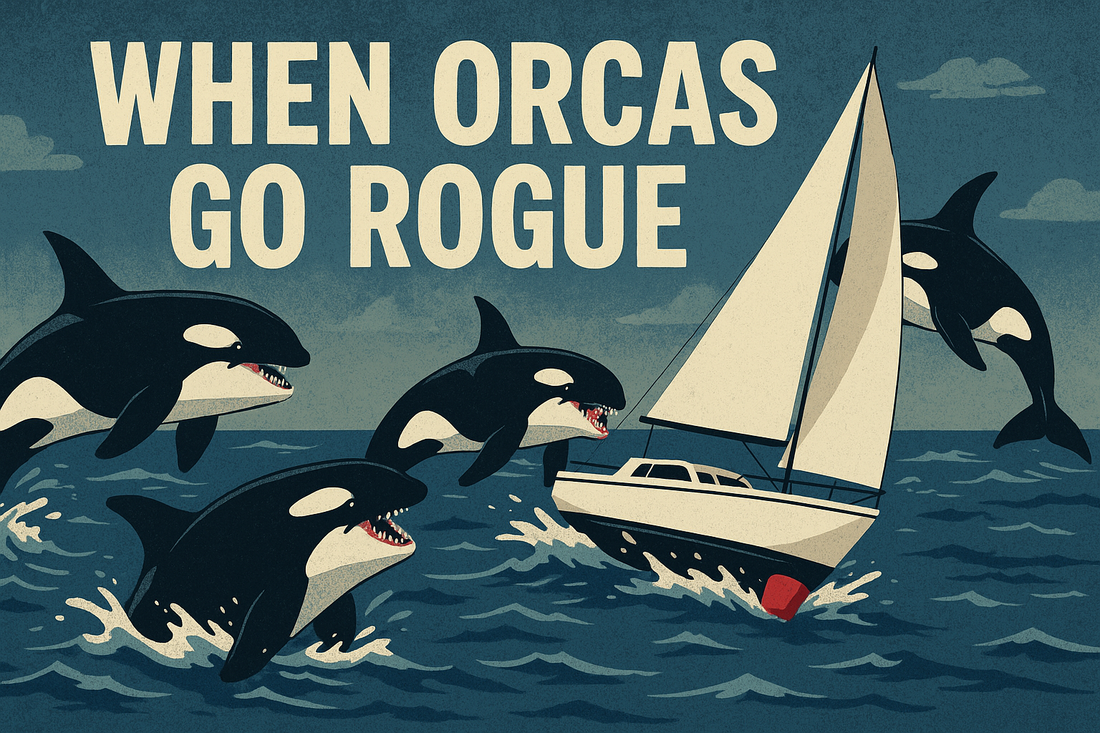
When Orcas Go Rogue: Four Whales That Said, “Screw Your Rudder”
Let’s get real for a minute. We’ve been wrecking the oceans for decades—plastic everywhere, noisy boats, overfishing, climate chaos—and now the orcas are hitting back. No, it’s not a sci-fi movie plot. Off the coast of Spain and Portugal, four particularly bold orcas have been smashing boat rudders like they’re auditioning for the ocean’s version of a demolition derby.
Since 2020, sailors navigating the waters off the Iberian Peninsula have reported a series of unusual and, at times, alarming encounters with orcas. These interactions, primarily involving the Iberian orca population, have seen the marine mammals ramming into boats, often targeting and damaging rudders. As of 2023, over 500 such incidents have been documented, with at least four vessels sinking as a result.
📍Hotspots of Activity
The majority of these interactions have occurred in specific regions:
-
Strait of Gibraltar: A significant number of incidents have been reported here, with orcas displaying persistent interest in vessels' rudders.
-
Gulf of Cádiz: This area has also seen a high frequency of encounters, prompting advisories for sailors to exercise caution.
-
Coasts of Galicia and Portugal: Reports indicate that the behavior has extended northwards, affecting boats along these coastlines.

🤔Deciphering Orca Behavior
Marine biologists have been working diligently to understand the motivations behind these interactions. Several theories have emerged:
-
Playful Curiosity: Juvenile orcas, known for their inquisitive nature, may be engaging with boat rudders as a form of play or exploration.
-
Learned Behavior: Observations suggest that this behavior could be a social fad, spreading among orca pods through imitation.
-
Hunting Practice: Some researchers propose that orcas are using boats to practice hunting techniques, particularly targeting rudders as they would the tails of prey like tuna.
-
Response to Trauma: A leading theory posits that a traumatic event experienced by a specific orca, nicknamed "White Gladis," may have initiated this behavior, which then propagated through social learning.
🛥️Impact on Maritime Activities
Here’s a video of an orca attack in the Strait of Gibraltar. No one was harmed, but there is the use of foul language—viewer discretion is advised.
The ramifications for sailors and maritime operations have been significant:
-
Safety Concerns: Damaged rudders can leave vessels adrift, posing risks to crew safety and necessitating rescue operations.
-
Economic Implications: Repairing damage from orca interactions can be costly, impacting both commercial and recreational maritime activities.
-
Navigational Advisories: Authorities have issued guidelines and advisories to help sailors avoid high-risk areas and respond appropriately during encounters.
🧭Navigating Forward: Coexistence and Conservation
Balancing human maritime interests with the conservation of the critically endangered Iberian orca population is paramount. Efforts are underway to:
-
Enhance Monitoring: Implement tracking systems to monitor orca movements and inform navigational advisories.
-
Promote Research: Support studies to better understand orca behavior and develop non-invasive deterrent methods.
-
Foster Awareness: Educate sailors and the public on best practices for safe and respectful marine wildlife interactions.
As we continue to explore the depths of orca behavior, fostering a harmonious coexistence between humans and these intelligent marine mammals remains a shared responsibility.
Immoral Coral — Celebrating the ocean’s dark sense of humor while it still lets us.

1 comment
How frightening for both parties involved! Great read! Thank you again for this viable information!!!